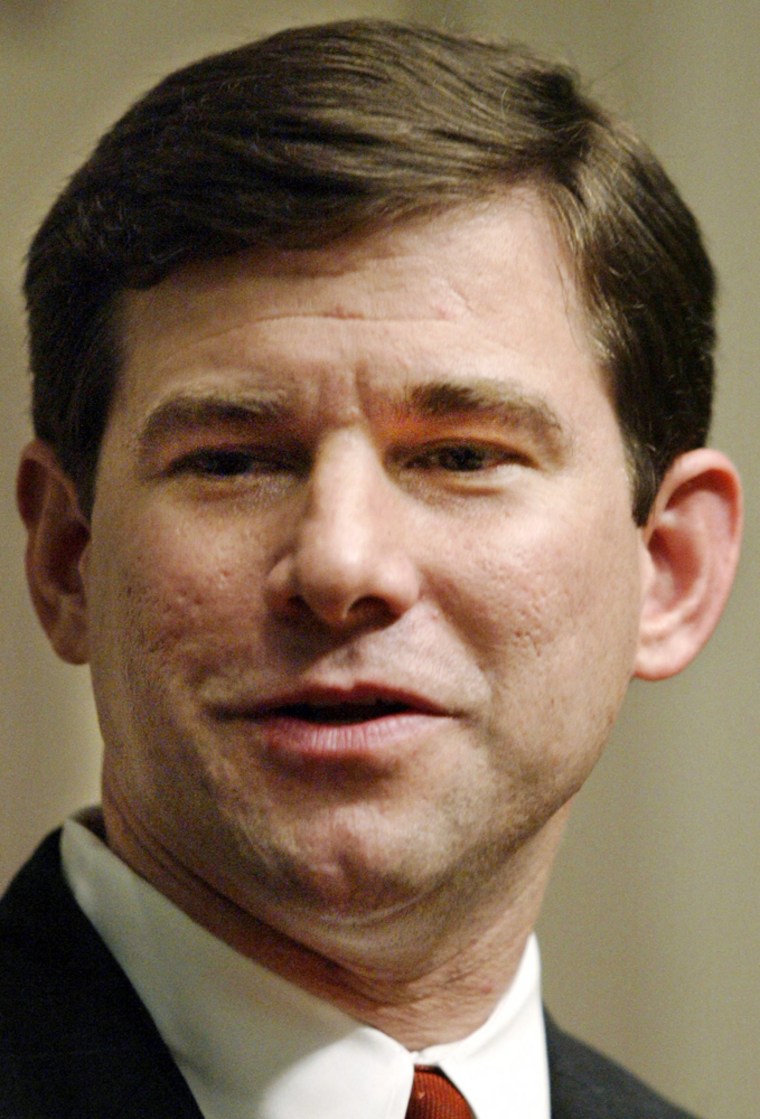The GOP-controlled Senate on Thursday approved former Alabama Attorney General William Pryor and Michigan nominees David McKeague and Richard Griffin for seats on the U.S. Appeals Court, completing an unprecedented run of long-delayed judicial confirmations.
With a vote of 53-45, Pryor was approved for 11th U.S. Circuit Court of Appeals, the Atlanta-based court that handles federal appeals from Alabama, Georgia and Florida. Griffin was confirmed 95-0 and McKeague 96-0, both for seats on the 6th Circuit Court of Appeals in Cincinnati.
President Bush gave Pryor a recess appointment in February 2004 after Democrats filibustered his confirmation. That appointment would have ended this year if Pryor had not been confirmed by the Senate.
After years, passage in three weeks
The Senate confirmed three of President Bush’s most-wanted appellate nominees in less than three weeks after Senate centrists looking to avoid a partisan battle over judicial filibusters struck a deal.
Pryor, Janice Rogers Brown and Priscilla Owen all had been waiting at least two years for Senate confirmation. Democrats have blocked the nominations of judges they consider too conservative.
Democrats had blocked Griffin and McKeague because Michigan’s senators were upset at Republicans for refusing to confirm President Clinton’s nominees to that court. While the two were not part of the filibuster deal, Democrats decided to allow them through as a gesture of good will.
“I could not be more pleased and proud that Judge Bill Pryor was part of the group that were agreed upon by those members of the Senate to get an up-or-down vote,” said Sen. Jeff Sessions, R-Ala., one of Pryor’s mentors and whose own nomination as a federal judge the Senate Judiciary Committee rejected in 1986. “Bill Pryor is the kind of judge America ought to have.”
Fight over recess appointment
Democrats had fought to keep Pryor from getting a permanent judgeship. Sen. Edward Kennedy, D-Mass., sued to have Pryor removed because he felt Bush’s recess appointment was illegal. The courts rejected Kennedy’s argument.
“After the president didn’t get his way with William Pryor, he took the truly extraordinary step of making a recess appointment,” said Sen. Charles Schumer, D-N.Y. “So while the renomination of rejected judges was a thumb in the eye, the recess appointment of Bill Pryor was a punch in the face.”
It takes 60 votes to bypass a filibuster. Republicans were able to get only 53 votes for Pryor in July 2003 and only 51 votes that November. On Wednesday the Senate voted 67-32 to end Pryor’s filibuster.
Boyle vote delayed
The Senate also plans to advance the nomination of Terrence Boyle, a North Carolina judge nominated to the 4th Circuit in Richmond, Va., though a vote in the Senate Judiciary Committee was delayed on Thursday.
Pryor’s stint on the Atlanta court has not caused any controversy, a point noted by Senate Judiciary Chairman Arlen Specter, R-Pa., who circulated some of Pryor’s writings on that court hoping they would sway some Democratic votes.
The Atlanta-based court helped to decide the fate of Terri Schiavo, the brain-damaged woman whose parents and husband fought all the way to the Supreme Court over whether to keep her alive. The federal courts refused to stop the removal of her feeding tube.
Pryor has never made public which way he voted in the Schiavo case. One of the court’s orders did say Pryor did not vote because he is recovering from surgery.
Flashpoint issues
Pryor opposes abortion rights and has criticized the Supreme Court’s Roe v. Wade decision. But he promised that he would follow the law if confirmed for the regional court, one step below the Supreme Court.
Still, Democratic leaders wanted Pryor stopped, saying he will be a conservative vote against civil rights, women’s rights and the environment.
“This is truly the trifecta on civil rights here this week in Washington, to confirm Janice Rogers Brown and William Pryor and to report Terrence Boyle from this committee,” said Sen. Richard Durbin of Illinois, the Senate’s No. 2 Democrat. “When it comes to the issue of civil rights, it’s a sad week.”
The deadlocks over the nominations of Pryor, Brown and Owen ended under last month’s historic deal on judicial filibusters. Crafted by Senate centrists, it avoided a partisan showdown over blocking the White House’s judicial nominees.
On to other subjects
Senators plan to leave Bush’s other controversial nominees dangling while they wait to see if there’s a Supreme Court debate in their future.
The Senate will move on to considering energy legislation and spending bills instead of taking up Bush’s other appellate nominees, including Henry Saad, William Myers, William Haynes and Brett Kavanaugh.
Democrats have been arguing that the Republican-controlled Senate has spent too much time on Bush’s judicial picks and not enough on the country’s other priorities.
“We have spent two months — two months — dealing with basically five judges, all of whom have jobs,” said Senate Democratic leader Harry Reid of Nevada.
Seven Democrats and seven Republicans signed a pact last month pledging not to filibuster judicial nominees except in extraordinary circumstances. At the same time, they agreed to oppose attempts by GOP leaders to change filibuster procedures.
